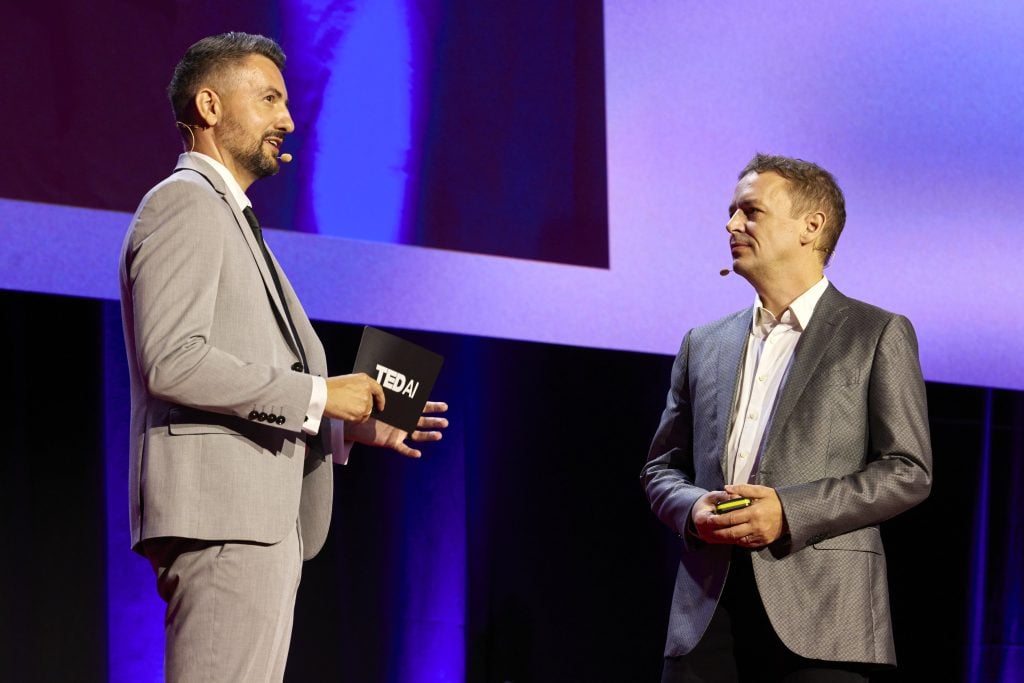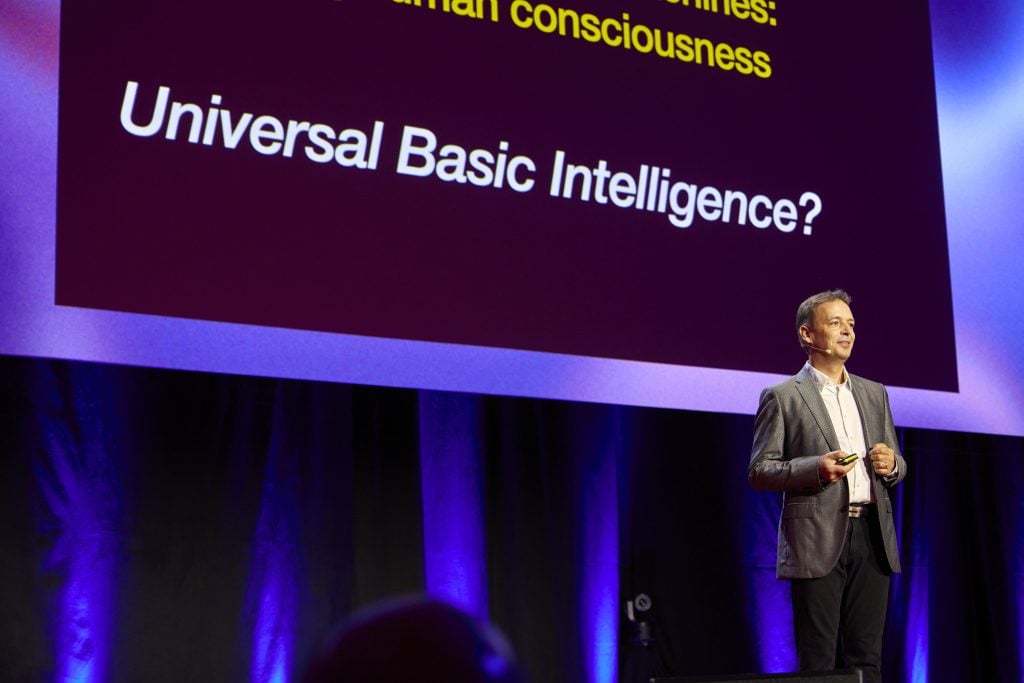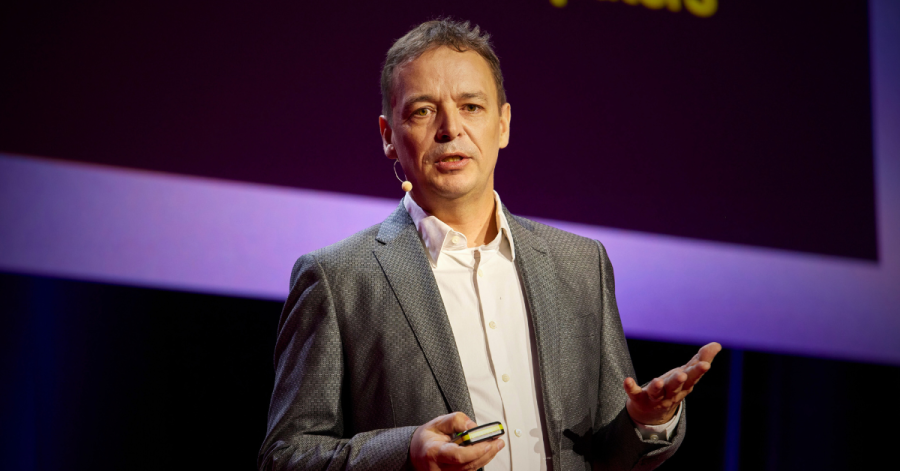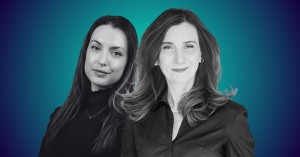The dizzying speed of the current AI boom has led many to question whether we are reliving the volatile days of the late 1990s.
With groundbreaking models accessible to virtually anyone and market valuations soaring, the comparison to the dot-com bubble is unavoidable. Yet, according to cognitive scientist Dr. h.c. Joscha Bach, while the historical parallel is useful for calibration, the true value of AI — like the Internet before it — will materialize, but perhaps on a timeline that defies today’s market hype.
At the recent TEDAI Vienna 2025, Bach offered unique perspective and guidance for the AI journey ahead. In the following interview we expand on what is that next step that can make AI reason(able) and aligned with humanity, that will inevitably bring some risks but also tremendous opportunities; how do we prepare for something that could completely alter our lives, still unsure whether we need (or can) change its course, and in what way?
On LLMs nearing diminishing returns
When asked whether today’s large language models are still improving or stalling, Bach reminded me of a familiar refrain: “It is very difficult to make predictions about the future.”
“Previous skeptics who claimed AI methods would soon hit a limit have been proven wrong; new ideas keep facilitating progress. The most recent move is toward building reasoning into models, so they no longer just predict the next token but also read text, reflect, and learn from those reflections — closer to how humans learn. It’s an open question whether they can become as coherent as critical, creative human readers, but there’s no proof they cannot“, he concludes.
Here, from the ground question about LLMs development, Bach storms to much higher overview: what is considered as a substantial and/or fast progress in the AI field? He points out that much of the progress is happening in small, incremental steps, driven by more available hardware and a larger community conducting experiments in parallel.
“On the other hand“, he adds, “there are people who are scared about sudden progress, about the possibility that we make breakthroughs that might change the landscape overnight“. From a broader perspective, things have indeed changed almost overnight. He points out that the AI revolution happening right now is comparable to the internet revolution, which led to the dot-com bubble.
“That dot-com bubble wasn’t misguided — the internet became an economic and civilizational factor, but the returns took longer than people expected. Valuations eventually materialized, and the bubble popped after the market caught up.”
Now, the open question is whether we’re in an AI bubble or seeing solid growth driven by viable business models, he points:
“The inertia required for economies to integrate AI into value creation fully is likely longer than many AI labs envision so that the transition will be gradual. Yet, these technologies have only existed for a few years. We started with models that predict arbitrary text, moved to chatbots — agents you can converse with one‑on‑one, but that’s not the final form.”
“There is still much more to see”
If not with LLMs, Bach envisions there is much more to the AI in general. “One avenue is multimodal models that co‑create with us“, he explains:
“They don’t just wait for input and produce output; they sit beside us, understand our intent, anticipate our actions, and become our natural extensions. There’s no law that a language model must be a chatbot — it can be an application, an environment, or any arbitrary tool. The potential of this technology is still untapped; we’re truly at the beginning.”

He sees multimodal models expanding video generation, world generation for games, and systems that can become situationally aware… “Imagine a phone that continuously interprets its surroundings, or a household where every appliance with a sensor and a Wi‑Fi chip connects to a shared internet resource, turning the house into an integrated mind that knows what each part is doing and what the human in between is doing…“
“It’s fascinating that the ‘Star Trek’ vision — telling a computer, car, washing machine, or any appliance what to do — is becoming reality. However, this isn’t just about building technology for its own sake; we must integrate it in ways that serve us and are helpful. This is still the beginning, making it an exciting time for startups.”
Are we in danger of “AI concentration”?
When we talk about companies that are developing foundation AI models, we all probably have in mind around three to four companies. The same goes for those who are providing infrastructure for it. We are not in a monopol or duopol situation currently— although it’s hard to tell what the future holds. Still, just a handful of companies handle state-of-the-art AI development today.
Is the field in a healthy place with this arrangement? To that, Bach adds very practical note: AI technology is not easy and cheap to run. His perspective on this is very positive, focusing on democratic aspect of the market dynamics, as he points:
“I didn’t expect we’d end up where everyone can use frontier models for around 20 dollars a month.“
“Numerous companies compete to make models cheaper and more powerful, providing access to everyone“, he explains further. Bach gives an example of open‑source models from firms like Meta, which have capabilities comparable to proprietary top‑tier models, and a large community of developers building, fine‑tuning, and creating new applications from them.
“Training models that cost double‑digit or triple‑digit millions of dollars is no longer feasible for a small university lab. Instead, investors fund large companies, which then release models to the public. I’m grateful for that; I don’t see a better alternative.“
“Historically, there’s been a push toward closed AI,“ Bach recalled.” A recent administration advised Andreessen Horowitz that supporting new AI companies would be pointless, aiming for a few large labs to build frontier models internally, heavily regulate them, and release limited‑capability versions to the public. That would have created a controlled transition with only a handful of players leveraging AI benefits. That world didn’t materialize, and as an AI researcher, I’m glad we still have democratization and openness.”
“If we heavily regulated the internet, we would only have teletext”
Many of you surely recall the “Pause Giant AI Experiments“ open letter that circulated back in 2023. Undoubtedly, some of you are still concerned about AI advancements — will it become too powerful for us to control?
Bach believes this leads us to a trade‑off. He frames it as: we will either empower people with the technology or play it safe, keeping the world as it is, and letting the technology trickle down slowly.
Is there a compromise? I wondered, so I asked for his perspective on what forms of governance or disclosure can improve safety without stifling progress. “It’s a tricky question“, Bach said, “perhaps analogous to early internet governance.“
“If, in the early internet, we had anticipated all dangers: disinformation, child pornography, copyright violations, and designed a system that prevented them entirely, the internet wouldn’t exist; we’d have only teletext.
The internet’s problems are dwarfed by its benefits. I suspect AI will be similar: it will create problems, most of which we’ll solve with AI itself.“
For example, Bach continues: “Disinformation will require watermarking human‑generated content, not vice-versa. We can’t watermark everything AI‑generated because bad actors won’t use watermarks. We’ll need information flow and authenticity, AI will build that technology.”
He thinks the most significant push for such solutions will come from user and company interests rather than government regulation. “In Europe, regulation gave us the cookie banner, which was largely unhelpful. Market competition among many developers will encourage wholesome solutions.“
“Regulation will be necessary“, he concludes, “but it must balance prevented harms against prevented benefits.“
“If we make AI completely safe — e.g., a text editor that only allows ‘safe’ sentences — we’d stifle literature. AI should enable deeper thinking and exploration, even if it produces uncomfortable ideas, just as art and science do. We must deal with harms when we can see them and have ways to prevent them.”
Can AI love (us)?
For the last part of our conversation, I couldn’t miss the opportunity to ask Bach about his current research and what keeps him up at night. One of the most impactful quotes I heard from his recent public appearings was that the only way we can coexist with an AGI system is if it “loves“ us. But what is love? Do we, as humans, even know? How can we even translate that to a machine?
In computational terms, “love could be viewed as value alignment“, Bach explains. This means it can learn our shared purposes and discover a “sacred“ set of goals higher than individual ego (family, ideals, a greater good). He believes that if we can embed such shared purposes in machines, they could align with what’s right.

However, humanity often lacks a shared understanding of higher purpose, confusing “good values“ with public opinion. But the world is much more complicated than that, Bach warns. For that reason, he points out that for love, truth is essential: “If you’re not truthful before you love, you don’t know what you’re loving. And so for me, the biggest issue that we have to resolve and for which AI can help us is the search for truth.“
“AI can help us search for truth, which institutions have largely abandoned in favor of politics — the art of what you get away with, not what actually needs to be done when you’re really honest. Ideally, I think we want a world where we don’t have to submit to the machines we built. I would prefer a world in which we stay in charge, in which the AI is extending us.“ In essence, Bach believes that building systems to discover truth and model outcomes can compel honesty from ourselves and each other.
“Understanding how to align ourselves is a prerequisite for aligning AI; if we cannot align ourselves, skeptics are justified.”
Aligning ourselves starts with questions like: What is my place in the world? How do I align my relationships? How do I align with my family, with my partner, with my children, with my parents, with my friends? At some point, we need to switch and ask ourselves: How do we scale this? How do we align with a society at large?
“How do I align with the inhomogenities in society that people have different impulses, play different games? How can we harmonize across this and still maintain an efficient society? And how does humanity relate to itself, the different cultures that are competing, that have different degrees of self-awareness and different perspectives on the future? And then, what is the place of humanity in life on Earth? Because we’re not alone here, and life on Earth is not about us, it’s about life on Earth. We’re just one species among many.”
As long as we are not trying to answer these questions, we are not yet in the room in which we can have the discussion on shared purposes or universal moral compass, Bach concludes.
Be/Build something you’d like to see in the world
As a journalist whose costume of devil’s advocate became its personal skeptic attire, I must say that Bach’s steadfast, positive, forward vision, that is aware of the obstacles, while still ambitious and hopeful about overcoming them, trusting with it the same humanity whose flaws its tries to eradicate — is puzzling and inspiring at the same time.
I hope that you too, while reading this, got a bit more positive about the change we need to make, advancing into the new AI age. The change that can and should be made, starting with each of us. With that said, I leave you with a final note from Bach: his advice for new aspiring founders, as well as researchers…
“For a startup, find a problem you and your friends experience, gain traction, and iterate until it works — don’t worry too much about competition. Build something you’d like to see in the world.
For research, AI is not only enabling new directions within AI but also across science. You can now integrate knowledge in ways that were previously impossible — systems that read papers, extract knowledge, map humanity’s tree of knowledge, validate it, and highlight underexplored areas.
This is a golden age for researchers: a moment where vast knowledge is at your fingertips.”







